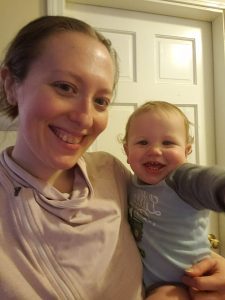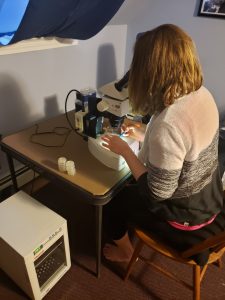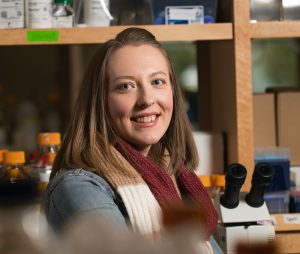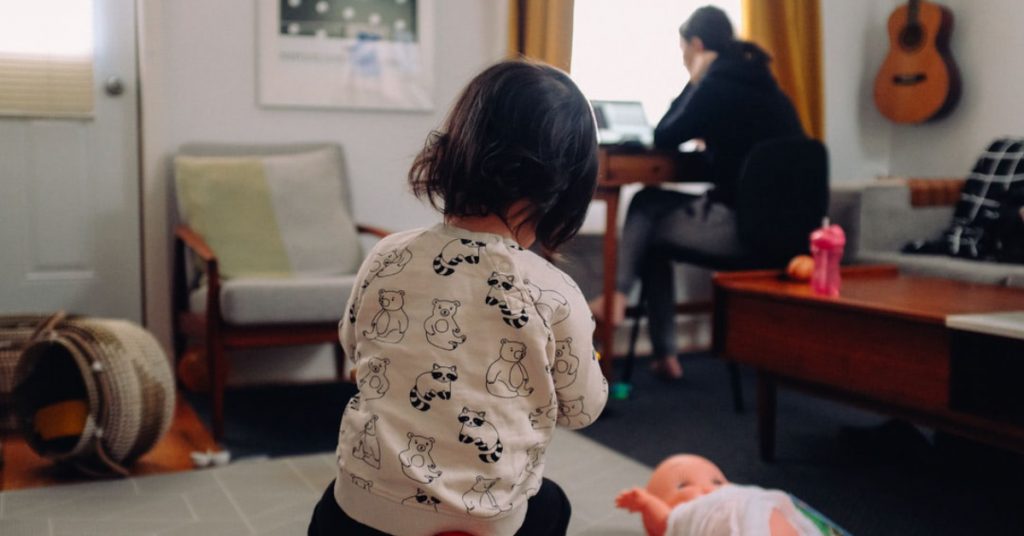As COVID-19 spreads across the world, members of the GSA community have had to face unprecedented challenges in their professional and personal lives. To stay connected during this socially distant time, GSA invites the scientists in our community to share how they are meeting these challenges, as well as their questions and worries.
If you would like to contribute to this series, please contact Communications Assistant Jacqueline Treboschi.
Guest post by Elisabeth Marnik, Ph.D.
 As I write this, I can hear my one-year-old son screaming in delight as he pushes his walker around the house. I can also hear the echoes of my husband’s fifteenth conference call of the day. Our house is nowhere big enough for the three of us right now. I long for the solitude of days in the lab where I could listen to things of my choosing or just bask in the quiet with a cup of coffee and my computer. I am a postdoc who works with C. elegans, and luckily, I was able to bring home a microscope and incubator to finish some ongoing experiments while minimizing physical lab presence. I am grateful for this option, but now most of my day is spent juggling barely controlled chaos—and it is hard and exhausting.
As I write this, I can hear my one-year-old son screaming in delight as he pushes his walker around the house. I can also hear the echoes of my husband’s fifteenth conference call of the day. Our house is nowhere big enough for the three of us right now. I long for the solitude of days in the lab where I could listen to things of my choosing or just bask in the quiet with a cup of coffee and my computer. I am a postdoc who works with C. elegans, and luckily, I was able to bring home a microscope and incubator to finish some ongoing experiments while minimizing physical lab presence. I am grateful for this option, but now most of my day is spent juggling barely controlled chaos—and it is hard and exhausting.
I am new at managing parenting and science in general. I had just started being comfortable in my new rhythm of science and motherhood when the pandemic hit and daycares closed. Life is now upside down as my husband and I try balancing two full-time jobs with childcare. I am also navigating the intense and overwhelming anxiety I feel for everyone I love, and the world in general, as COVID-19 explodes. Even in my moments of quiet, I often find myself struggling between organizing data for a figure, trying to entertain my son, crying, or obsessing over the newest COVID-19 news and research. It is all impossible. At the end of the day, I am often left feeling like an utter failure as a mother and as a scientist.
I’ve finally realized that this is not sustainable. We are three and a half weeks into a process that has no end in sight yet. It is impossible for me to get as much work done as I did before. No one can be both a stay at home parent and a full-time working parent. There are just not enough hours in the day. Thus, I have started making long to-do lists for the work I need to accomplish. I tell myself that even if I only check off the bare minimum that day, it is OK. I also keep telling myself that a little extra baby music videos aren’t going to ruin my son, and that as long as he is healthy and fed, my husband and I are doing a good job. I don’t need to be doing crafts with him every day to be a good mom.
 I am also trying (with mixed success) to make time for self-care. For me this means running, lessening my media consumption, attending virtual therapy appointments, and enjoying weekly Zoom meetings with friends and family. I know that I am a better mom and scientist when I make time for these things, even if they are often the first things I want to cut when time is short.
I am also trying (with mixed success) to make time for self-care. For me this means running, lessening my media consumption, attending virtual therapy appointments, and enjoying weekly Zoom meetings with friends and family. I know that I am a better mom and scientist when I make time for these things, even if they are often the first things I want to cut when time is short.
I also recognize my privilege, even in this situation. I am lucky to have an equal partner, two paychecks, a supportive PI, and my own funding that makes many of my productivity worries internally, rather than externally, motivated . I know this is not universally the case. We are all struggling in our own ways, but some struggles are undoubtedly greater than others. I see you, and I wish I could help more.
Ultimately, I keep reminding myself that we are all living through a historic and unprecedented situation. We cannot hold ourselves to normal standards of parenting or science productivity. If you’re keeping your kids fed and safe, you’re winning. The rest is just a bonus. You are not alone if you feel like a failure or are struggling. I am there with you every single day. But one day this will be over. One day we will return to our labs, and our children will return to their schools and daycares.
In the meanwhile, please consider joining the GSA’s Parents in Science Slack channel so that we can start a community of support to help each other through this difficult time.
About the Author
 Elisabeth Marnik is a postdoctoral researcher in the Updike Lab at The MDI Biological Laboratory. Marnik is a member of the GSA’s Conference Childcare Committee and a GSA Early Career Scientist Leader (Communication and Outreach Subcommittee).
Elisabeth Marnik is a postdoctoral researcher in the Updike Lab at The MDI Biological Laboratory. Marnik is a member of the GSA’s Conference Childcare Committee and a GSA Early Career Scientist Leader (Communication and Outreach Subcommittee).













